Are you looking to create a kitchen that balances style with eco-friendliness? Sustainable design is becoming essential in modern home construction, focusing on materials that minimize environmental impact. This article will explore innovative options like marble countertops, eco-friendly sinks, and sustainable shelf materials, demonstrating how they contribute to a greener kitchen. Readers will learn how to make informed choices that align with their values, addressing common challenges in selecting sustainable options. By incorporating these materials, homeowners can not only enhance their kitchen but also support environmental responsibility.
The Importance of Sustainable Kitchen Design
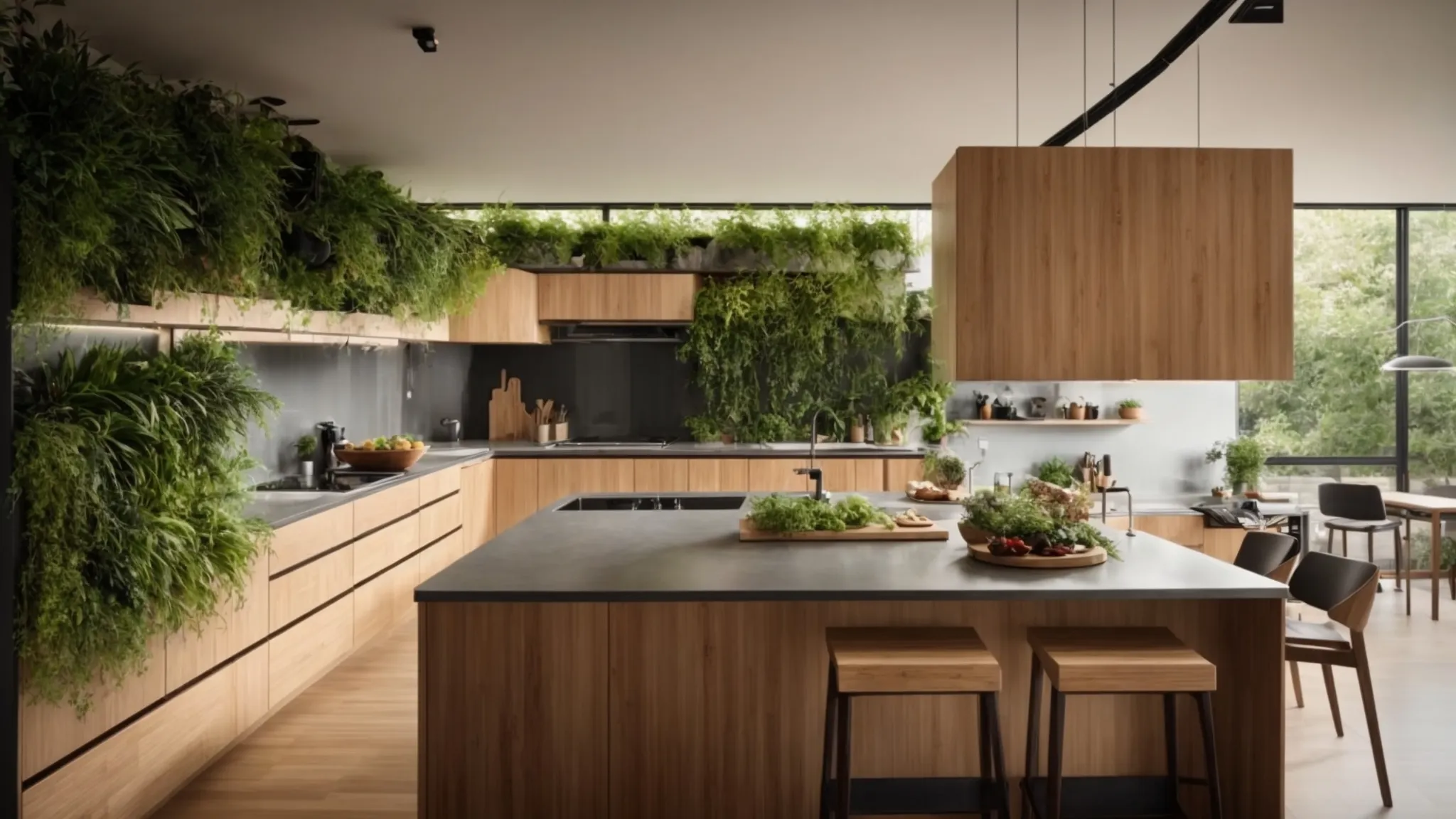
Sustainable kitchen design plays a crucial role in remodeling, as it addresses the environmental impact of traditional materials and the harmful effects of substances like formaldehyde. By opting for eco-friendly choices, homeowners can enjoy benefits such as enhanced home value and improved health. Sustainable design aligns with green living principles, though it may present challenges during renovations, including sourcing responsible materials and integrating automation effectively.
Understanding the Environmental Impact of Traditional Materials
Traditional materials used in kitchen renovations, such as standard lumber and non-eco-friendly cabinetry, can have significant environmental consequences. Many conventional options are sourced from unsustainable forests or treated with harmful chemicals, including formaldehyde, which can adversely affect indoor air quality. By transitioning to eco-friendly alternatives, like responsibly sourced lumber and natural brass fixtures, homeowners can enhance both the utility and sustainability of their kitchen spaces while reducing their ecological footprint.
Benefits of Choosing Eco-Friendly Options for Your Kitchen
Choosing eco-friendly options for kitchen design not only promotes sustainability but also enhances the overall sophistication of the space. Utilizing energy-efficient appliances, such as those equipped with home automation features, can significantly reduce electricity consumption, leading to long-term cost savings. Additionally, selecting sustainable flooring options, like bamboo or reclaimed wood, not only contributes to a healthier environment but also elevates the aesthetic appeal of the kitchen, providing a perfect blend of functionality and style:
Enhancing Home Value and Health With Sustainable Design
Implementing sustainable design in kitchens not only promotes environmental responsibility but also enhances overall home value and occupant health. Kitchen materials such as recycled steel and eco-friendly granite contribute to a more durable and aesthetically pleasing environment, which appeals to modern buyers. By prioritizing convenience and minimizing plastic usage, homeowners can create a kitchen that supports healthier living while increasing property attractiveness and resale potential:
Aligning Kitchen Design With Green Living Principles
Aligning kitchen design with green living principles involves selecting materials and practices that minimize environmental impact while enhancing functionality. Utilizing wood sourced from sustainably managed forests reduces carbon footprints and supports responsible forestry. Additionally, opting for products free from harmful organic compounds allows homeowners to create healthier spaces that prioritize both aesthetics and health, reflecting a commitment to eco-conscious kitchen and bath architecture.
Overcoming Challenges in Sustainable Kitchen Renovations
Overcoming challenges in sustainable kitchen renovations often involves addressing the availability and cost of environmentally friendly materials. For instance, homeowners may find sourcing materials like recycled steel or sustainably harvested wood daunting due to market limitations. By leveraging local suppliers focused on green building practices, homeowners can enhance the sustainability of their kitchen while minimizing transportation emissions and utilizing renewable energy sources, ultimately creating a pantry that reflects their commitment to eco-conscious living.
Sustainable kitchen design forms the backbone of an eco-friendly home. Now, let’s explore the top materials for countertops that can enhance both beauty and sustainability in your kitchen.
Top Eco-Friendly Materials for Kitchen Countertops
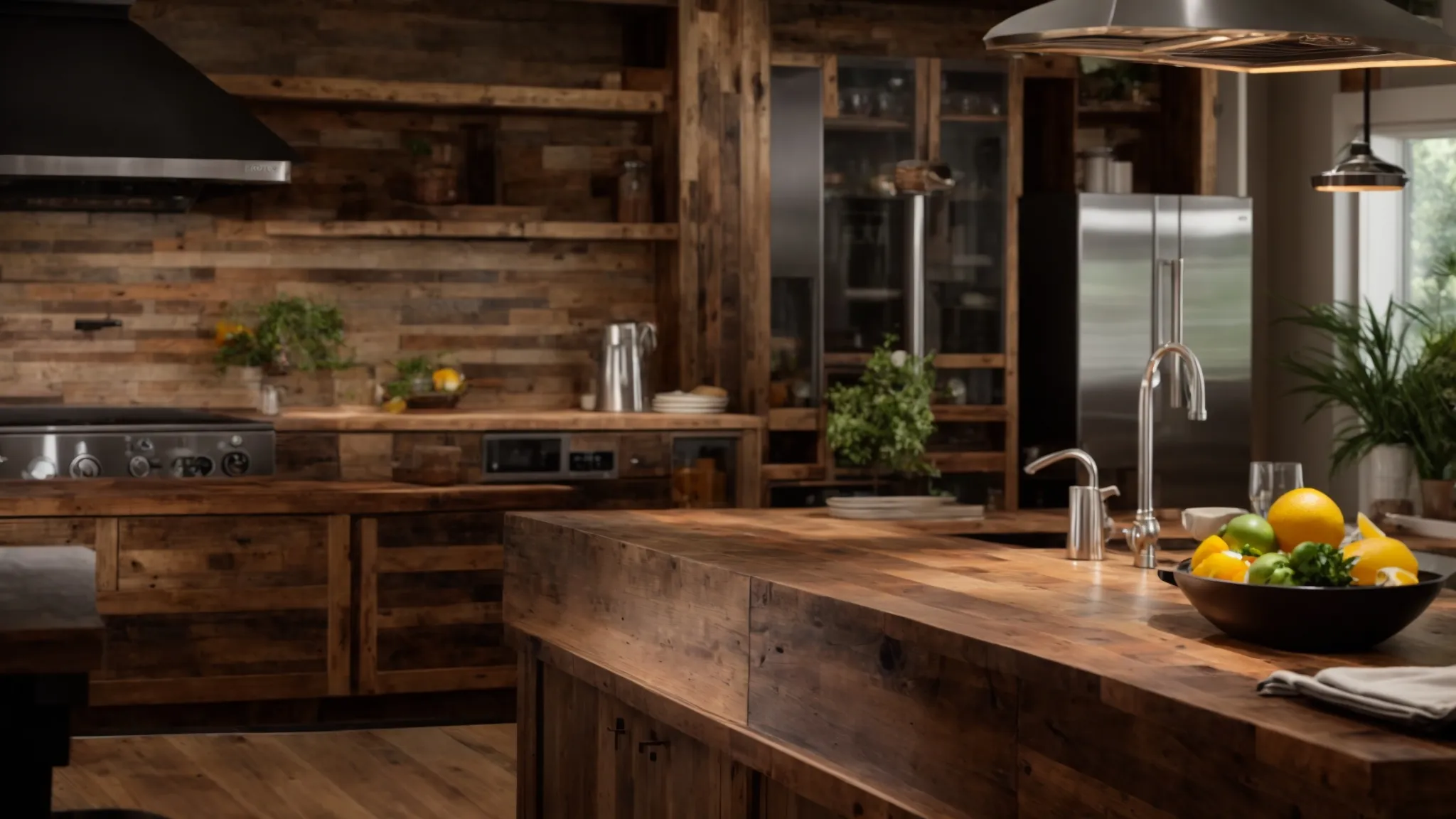
Exploring eco-friendly kitchen countertops reveals a variety of sustainable options that enhance both aesthetics and functionality. Reclaimed wood countertops add warmth and character, while bamboo surfaces offer durability and sustainability. Recycled glass countertops represent a responsible choice, whereas concrete options can incorporate recycled content. Additionally, selecting natural stone with a low environmental impact contributes to a conscientious kitchen cabinet design, appealing to architects and environmentally focused homeowners alike.
Reclaimed Wood Countertops Bring Warmth and Character
Reclaimed wood countertops offer homeowners a unique blend of warmth and character, making them an ideal choice for Kitchen Remodeling projects. These surfaces, often salvaged from old barns or structures, not only bring a rustic charm but also minimize the release of volatile organic compounds, which are commonly found in new lumber treatments. Using reclaimed wood supports sustainable practices while providing an aesthetically pleasing option that complements various design themes, helping to create a kitchen that feels both inviting and environmentally responsible.
Bamboo Surfaces Offer Durability and Sustainability
Bamboo surfaces offer a remarkable combination of durability and sustainability, making them an ideal resource for modern kitchen designs. Known for their hardiness, bamboo countertops can withstand daily tasks and are resistant to scratches and dents, helping to maintain a clean atmosphere in any kitchen. Additionally, when paired with stainless steel appliances, bamboo enhances the minimalist aesthetic while providing an environmentally friendly option that meets the needs of homeowners seeking both functionality and style. Easy maintenance, including compatibility with standard dishwashers, further makes bamboo a practical choice for busy kitchens, ensuring that eco-conscious living does not compromise on usability.
Recycled Glass Countertops as a Responsible Choice
Recycled glass countertops present an appealing choice for those pursuing sustainable kitchen design. These countertops can be crafted from reclaimed glass tiles, allowing homeowners to significantly minimize their carbon footprint while enhancing the elegance of their kitchen spaces with beautiful mosaic patterns. When paired with classic materials like oak cabinetry, recycled glass countertops not only showcase individual style but also demonstrate a commitment to responsible living through the use of eco-friendly materials.
Concrete Countertops Incorporating Recycled Content
Concrete countertops incorporating recycled content exemplify a strong commitment to sustainability in kitchen design. By utilizing materials such as ground-up glass, metal shavings, or recycled plywood, these countertops not only enhance usability but also contribute to unique interior design aesthetics. The durability of concrete, combined with its versatile styling options, allows homeowners to create a modern kitchen space that reflects both environmental responsibility and functional elegance.
Selecting Natural Stone With Low Environmental Impact
Selecting natural stone with low environmental impact involves understanding the sourcing practices and materials that minimize waste. Options such as responsibly mined granite or quartzite not only deliver aesthetic appeal through their unique hues but also align with biophilic design principles, promoting a natural connection within kitchen spaces. By choosing solid surfaces derived from eco-conscious sources, homeowners can create inviting, stylish environments while positively contributing to sustainable practices in kitchen design.
Choosing the right materials for countertops is just the beginning. Now, let’s turn our attention to sustainable flooring options that will complement your green kitchen and keep your home stylish.
Sustainable Flooring Options for a Green Kitchen
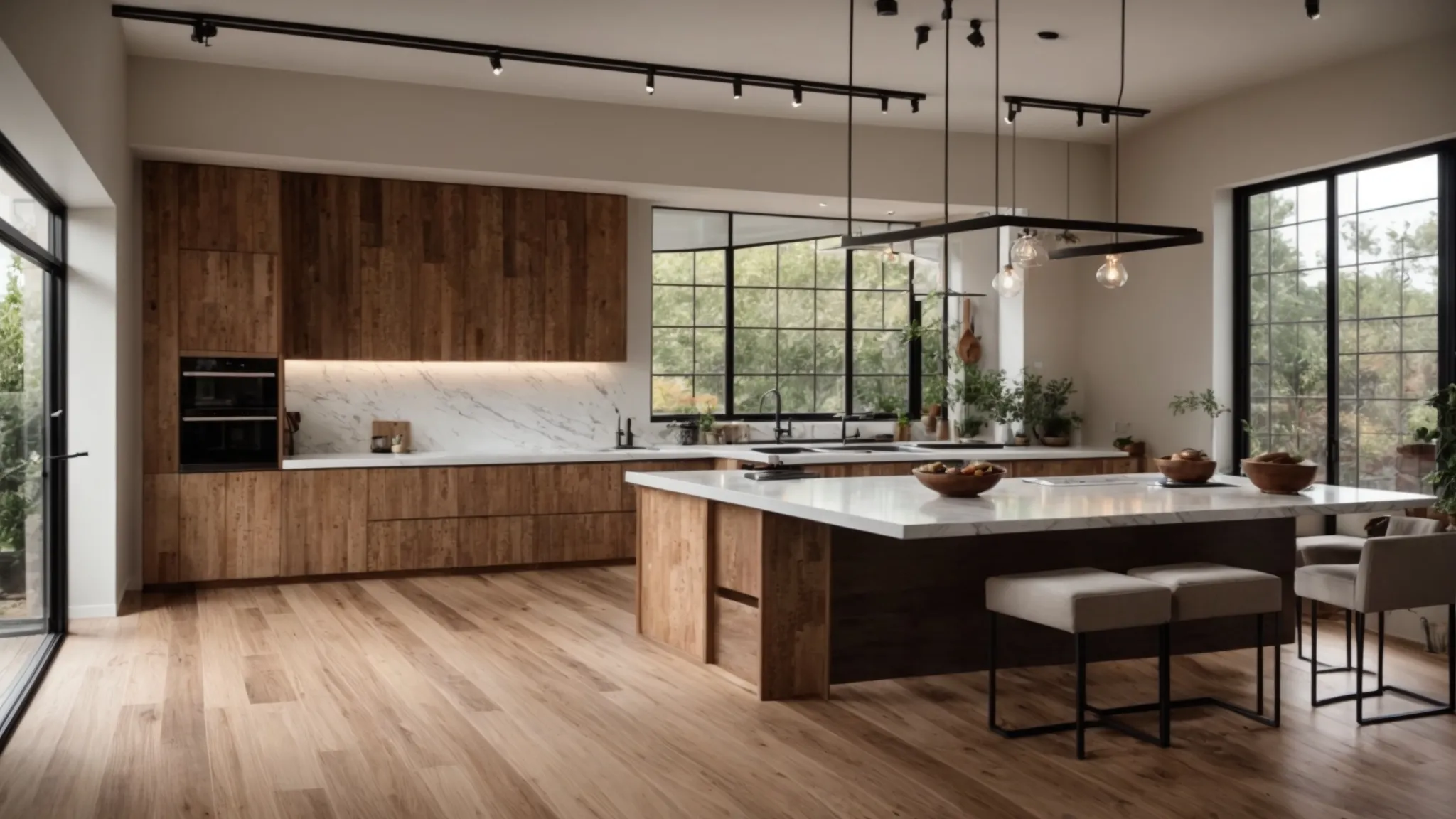
Sustainable flooring options greatly contribute to eco-friendly kitchen design by enhancing indoor air quality and accessibility. Cork flooring provides exceptional comfort while promoting eco-friendliness, while linoleum serves as a responsible alternative to vinyl. Salvaged hardwood floors offer beauty and history, and porcelain tiles made from recycled materials present innovative choices. Effective maintenance practices further ensure that these sustainable kitchen floors remain functional and appealing.
Cork Flooring Provides Comfort and Eco-Friendliness
Cork flooring is an excellent choice for kitchen remodeling, providing both comfort and eco-friendliness. This material is sourced from the bark of cork oak trees, which regenerate naturally, ensuring sustainability. Additionally, cork offers a soft and cushioned surface that reduces fatigue during prolonged standing, making it ideal for busy kitchens. Total CC Services recommends cork for its ability to enhance a kitchen’s aesthetic while promoting healthier indoor air quality, creating an inviting space that meets the needs of homeowners committed to sustainable design.
Choosing Linoleum Over Vinyl for an Eco-Friendly Floor
Choosing linoleum over vinyl for kitchen flooring offers a more eco-friendly solution that aligns with sustainable design trends. Linoleum is made from natural materials like linseed oil, cork dust, and wood flour, making it biodegradable and less harmful to indoor air quality compared to vinyl, which often contains harmful chemicals and plastics. Homeowners seeking to reduce their environmental impact while enhancing the aesthetic appeal of their kitchens will find that linoleum not only provides durability but also contributes to a healthier living space.
Salvaged Hardwood Floors Combine Beauty and History
Salvaged hardwood floors offer a unique blend of aesthetic charm and historical significance, making them a standout choice for eco-friendly kitchen design. These floors, sourced from deconstructed buildings or reclaimed wood, not only reduce waste but also bring character to a kitchen space. Homeowners can appreciate the beauty of these floors while making a sustainable choice that positively impacts indoor air quality and supports responsible resource use:
Porcelain Tiles Made From Recycled Materials
Porcelain tiles made from recycled materials serve as an excellent choice for sustainable kitchen flooring, combining both durability and eco-friendliness. These tiles often incorporate post-consumer waste, such as glass and ceramic, reducing the demand for new raw materials and minimizing environmental impact. By choosing porcelain tiles, homeowners can achieve a stylish, long-lasting flooring solution that aligns with their commitment to sustainable design while maintaining a contemporary kitchen aesthetic.
Maintaining Sustainable Kitchen Floors Effectively
Maintaining sustainable kitchen floors effectively involves regular cleaning with eco-friendly products to preserve their integrity and appearance. For materials like cork and bamboo, it is important to avoid harsh chemicals that can damage the finishes. Additionally, homeowners should implement a routine that includes sweeping or vacuuming to remove dirt and debris, along with occasional damp mopping to maintain a clean and healthy kitchen environment.
- Regular cleaning with eco-friendly products preserves floor integrity.
- Avoid harsh chemicals that can damage sustainable finishes.
- Implement routine sweeping or vacuuming to keep floors free of debris.
- Occasional damp mopping ensures a clean and healthy kitchen environment.
The kitchen breathes life through its floors, a foundation of eco-friendly choices. Next, the cabinetry should mirror this commitment to nature, providing options that are both functional and responsible.
Cabinetry Choices That Support Environmental Responsibility
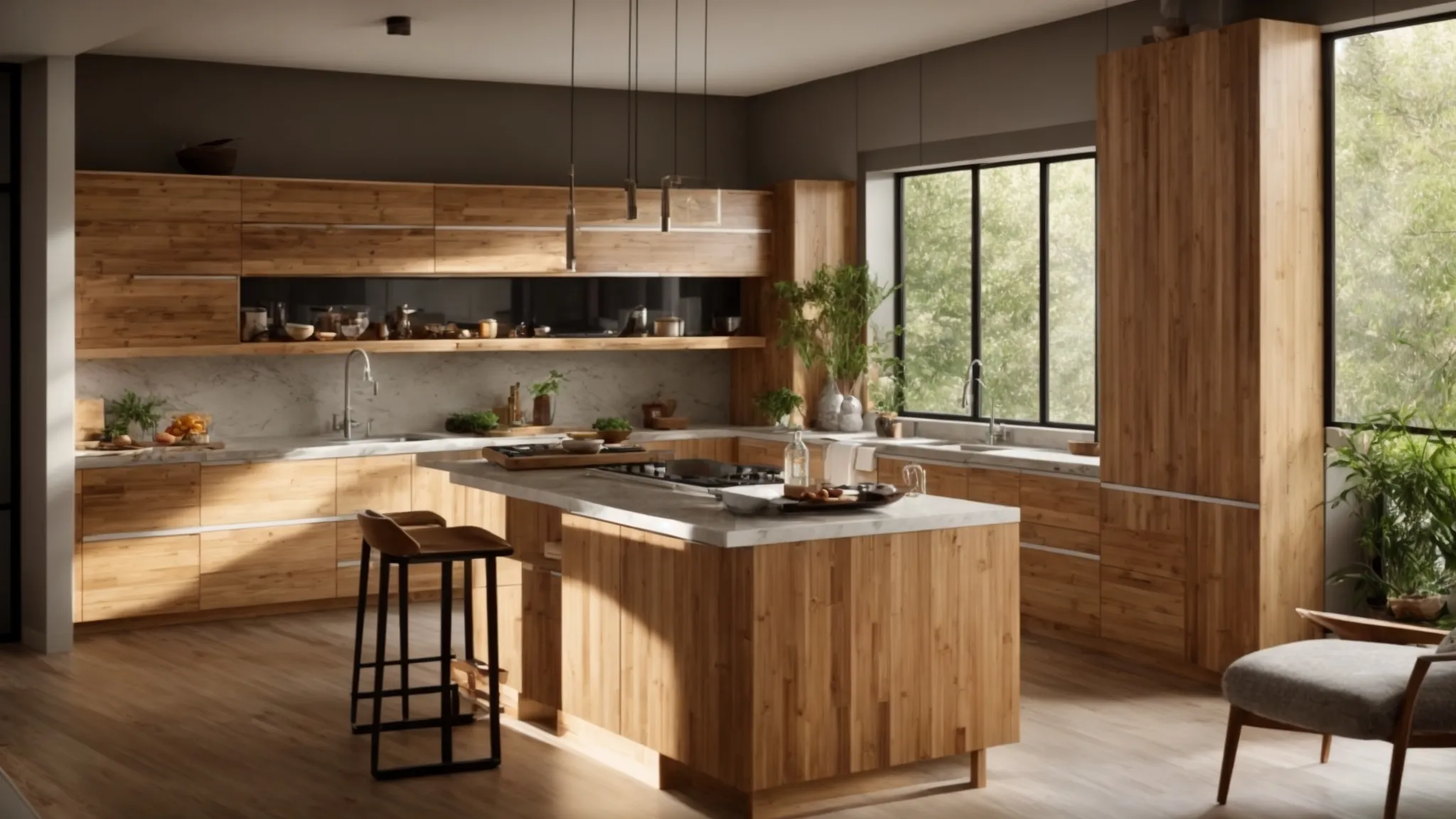
Choosing cabinetry that supports environmental responsibility is essential for eco-friendly kitchen design. Selecting cabinets made from reclaimed wood offers a sustainable option that reduces waste. Utilizing non-toxic finishes enhances indoor air quality, while formaldehyde-free plywood minimizes harmful emissions. Innovative bamboo cabinets further promote sustainability, and partnering with environmentally responsible cabinet manufacturers provides reliable solutions for health-conscious homeowners.
Selecting Cabinets Made From Reclaimed Wood
Selecting cabinets made from reclaimed wood represents a sustainable choice that not only reduces waste but also enhances the character of any kitchen. Reclaimed wood, sourced from old barns, factories, or other structures, offers unique grain patterns that infuse warmth and history into the design. By opting for these cabinets, homeowners can contribute to environmental responsibility while achieving a custom look that reflects their personal style, ultimately addressing both aesthetic desires and eco-conscious values.
Utilizing Non-Toxic Finishes for a Healthier Home
Utilizing non-toxic finishes for kitchen cabinetry significantly enhances indoor air quality while aligning with sustainable design trends. Homeowners can select finishes that are free from harmful chemicals, including volatile organic compounds (VOCs), promoting a healthier home environment. These eco-friendly options not only safeguard occupants’ well-being but also add a polished look to cabinetry, showcasing a commitment to both style and environmental responsibility.
Advantages of Formaldehyde-Free Plywood in Cabinetry
Utilizing formaldehyde-free plywood in cabinetry offers significant advantages for those seeking eco-friendly kitchen materials. This type of plywood minimizes harmful emissions that can negatively affect indoor air quality, addressing a common concern among homeowners interested in sustainable design. Moreover, formaldehyde-free options not only contribute to healthier living environments but also enhance the aesthetic appeal of cabinetry, showcasing a commitment to both style and environmental responsibility.
Innovative Bamboo Cabinets Enhance Sustainability
Innovative bamboo cabinets stand out as a practical choice for eco-friendly kitchen design, offering durability and sustainability without sacrificing style. Sourced from fast-growing bamboo, these cabinets provide a responsible alternative to traditional wood materials, helping to conserve forests while ensuring aesthetic appeal. Their natural resilience makes them suitable for high-traffic areas, addressing the need for functional and attractive cabinetry that supports both environmental responsibility and modern living.
Finding Environmentally Responsible Cabinet Manufacturers
Finding environmentally responsible cabinet manufacturers involves researching companies that prioritize sustainable practices in their production processes. Homeowners should seek manufacturers that utilize certified wood sources, engage in eco-friendly manufacturing techniques, and offer non-toxic finishes. By supporting these manufacturers, individuals can ensure their cabinetry choices contribute positively to both the environment and their overall kitchen design, reflecting a commitment to sustainability and healthy living.
As homeowners seek to make responsible choices, they find new paths that lead to creativity. Recycled materials are changing the landscape of kitchen design, offering fresh possibilities that are both practical and beautiful.
Innovative Recycled Materials Transforming Kitchen Design
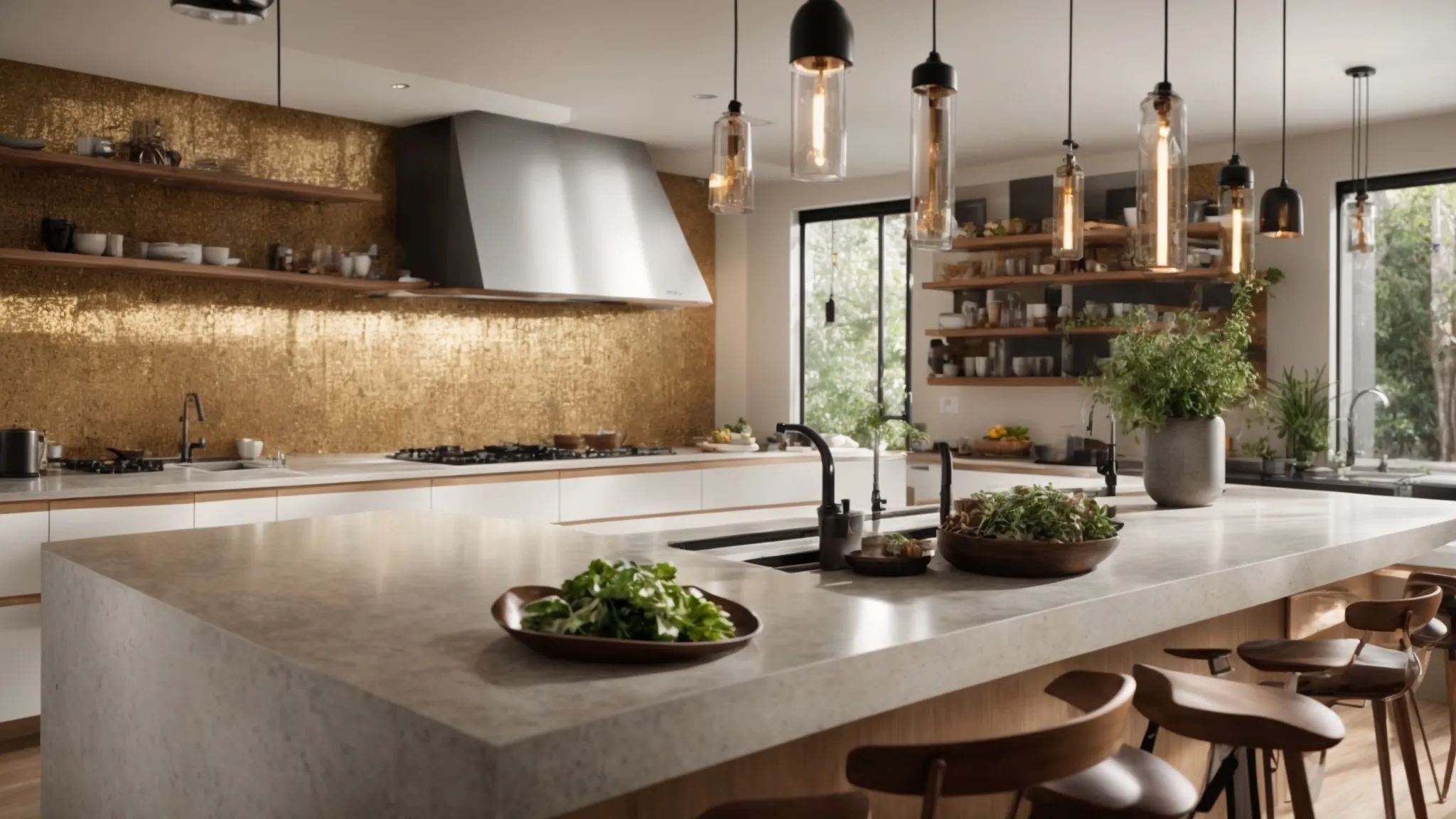
Incorporating innovative recycled materials into kitchen design introduces a range of eco-friendly options that elevate both style and sustainability. Utilizing recycled metal accents enhances visual appeal, while reclaimed tiles for backsplashes and walls provide unique character. Eco-friendly hardware crafted from recycled components and upcycled elements in décor further emphasize this trend. Lastly, exploring the future of sustainable materials in kitchens highlights the ongoing commitment to environmental responsibility.
Incorporating Recycled Metal Accents for Style
Incorporating recycled metal accents into kitchen design serves as a stylish and sustainable choice for homeowners. Elements such as recycled copper or aluminum fixtures not only enhance the aesthetic appeal of the space but also contribute to environmental responsibility by reducing waste. By selecting these materials, homeowners can achieve a contemporary look while supporting sustainable practices, thereby creating a kitchen that reflects their commitment to eco-friendly living.
Using Reclaimed Tiles for Backsplashes and Walls
Using reclaimed tiles for backsplashes and walls in kitchen design represents a sustainable option that brings character and history to any space. These tiles, often sourced from deconstructed buildings, not only help reduce waste but also provide unique aesthetic qualities that new tiles cannot replicate. Homeowners can enhance their kitchens with vibrant colors and distinctive patterns while committing to eco-friendly practices, ensuring that their design choices reflect both style and environmental consciousness.
Eco-Friendly Hardware Crafted From Recycled Components
Eco-friendly hardware crafted from recycled components offers a practical and stylish solution for enhancing kitchen design while supporting sustainability. By utilizing materials such as recycled metals for knobs, pulls, and hinges, homeowners can reduce waste and minimize their environmental footprint. Additionally, these recycled hardware options not only contribute to a modern, cohesive look but also ensure durability, aligning with the growing demand for sustainable practices in kitchen renovations.
Adding Upcycled Elements Into Kitchen Décor
Adding upcycled elements into kitchen décor is an effective way to enhance sustainability while showcasing unique style. Items such as reclaimed wood shelves, vintage glassware, and repurposed furniture pieces not only reduce waste but also add character and history to the kitchen space. Homeowners looking to embrace eco-friendly design trends can creatively integrate these elements, ensuring their kitchen reflects both environmental responsibility and personal aesthetic:
Exploring the Future of Sustainable Materials in Kitchens
As homeowners increasingly prioritize eco-friendly kitchen materials, the future of sustainable design appears promising. Advances in technology have led to the development of innovative materials, such as bio-based composites made from agricultural byproducts or recycled plastics, which not only reduce waste but also fulfill aesthetic and functional requirements. By actively seeking out these emerging resources, homeowners can create kitchens that reflect a modern commitment to sustainability while still enjoying high-quality, durable finishes and designs.
Recycled materials bring fresh possibilities to kitchen design. Next, explore how to weave these sustainable choices into your own space.
Strategies for Integrating Sustainable Materials Into Your Kitchen
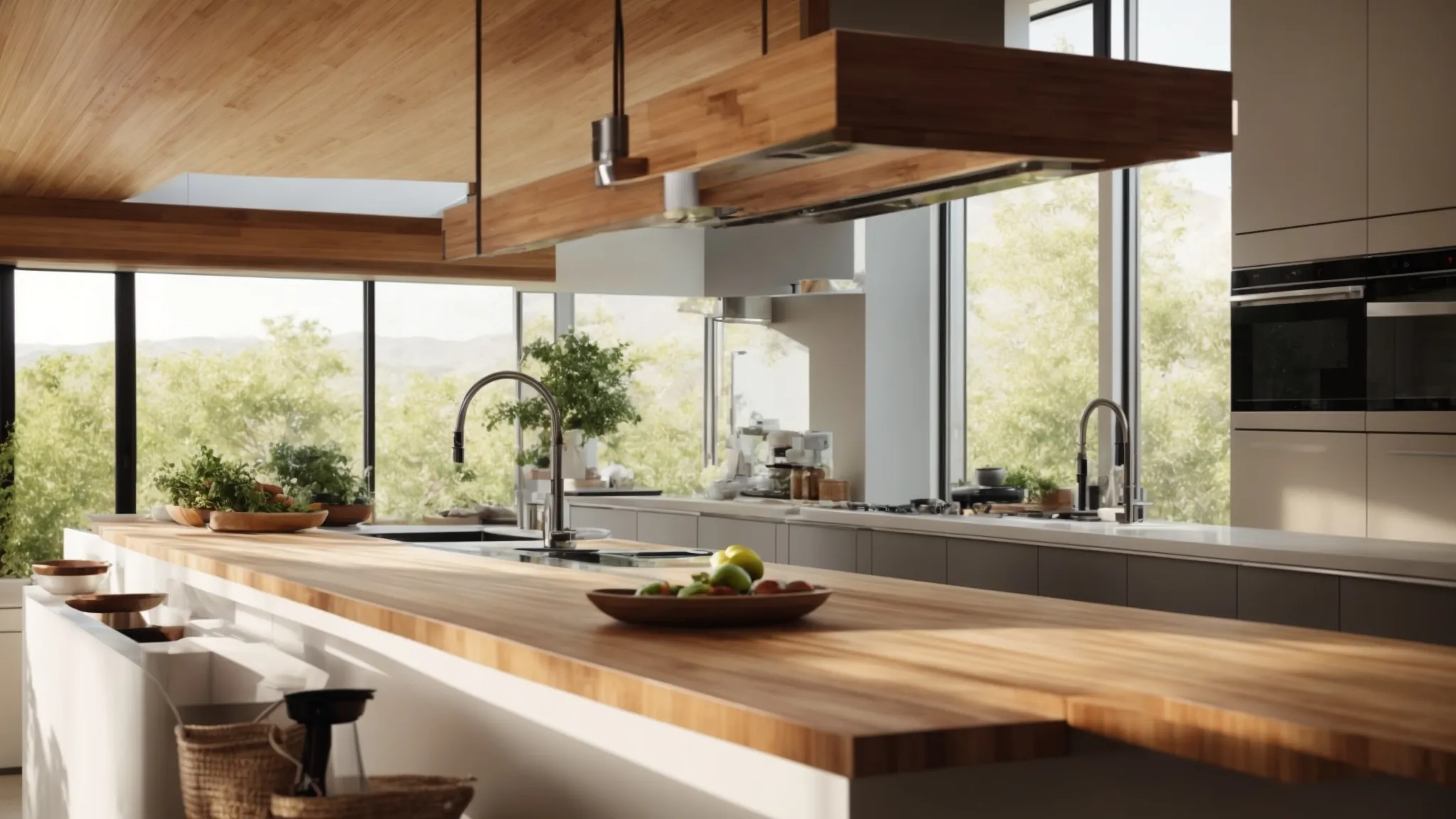
Integrating sustainable materials into kitchen design requires strategic planning to ensure a successful renovation. Homeowners should consider setting a budget for eco-friendly upgrades, locating reliable suppliers of sustainable products, and balancing aesthetics with environmental responsibility. Additionally, deciding between DIY and professional green renovations, along with understanding the proper care and maintenance of eco-friendly materials, will enhance the overall effectiveness of the project.
Setting a Budget for Eco-Friendly Kitchen Upgrades
Setting a budget for eco-friendly kitchen upgrades is essential for homeowners interested in sustainable design trends. By carefully assessing the costs associated with eco-friendly materials—such as reclaimed wood, energy-efficient appliances, and low-VOC finishes—they can allocate resources more effectively. For example, homeowners might prioritize high-impact areas, like countertops and cabinetry, while exploring financing options or incentives for energy-efficient appliances to maximize both sustainability and budget.
- Assess costs of eco-friendly materials.
- Prioritize high-impact areas in the kitchen.
- Explore financing options for energy-efficient appliances.
Locating Reliable Suppliers of Sustainable Products
Locating reliable suppliers of sustainable products is a critical step for homeowners looking to embrace eco-friendly kitchen materials. Researching local suppliers who specialize in sustainable building practices can yield high-quality options, from reclaimed wood to low-VOC finishes. Engaging with online platforms that focus on green building materials or attending local home shows can also provide valuable insights and connections to reputable vendors committed to sustainability.
Balancing Aesthetics With Environmental Responsibility
Balancing aesthetics with environmental responsibility involves making thoughtful choices that enhance the visual appeal of the kitchen while prioritizing eco-friendly materials. Homeowners can utilize reclaimed wood or eco-conscious finishes that not only provide unique character but also align with green living principles. For instance, opting for energy-efficient appliances with sleek designs helps create an elegant atmosphere, focusing on functionality without compromising sustainability.
Deciding Between DIY and Professional Green Renovations
When deciding between DIY and professional green renovations for an eco-friendly kitchen, homeowners must evaluate their skills, time, and project complexity. DIY projects can be cost-effective and customizable, allowing for personal touches with sustainable materials, but they require a certain level of expertise to avoid costly mistakes. Hiring professionals can ensure high-quality workmanship and a smooth integration of sustainable options, particularly for more complex tasks like plumbing or electrical work, ultimately optimizing the potential for a successful green kitchen transformation.
Proper Care and Maintenance of Eco-Friendly Materials
Proper care and maintenance of eco-friendly materials is essential to preserve their beauty and functionality over time. Homeowners should utilize gentle cleaning solutions free from harsh chemicals to avoid damaging surfaces like bamboo and cork flooring. Regular maintenance practices, such as sweeping, damp mopping, and avoiding abrasive tools, can help ensure that sustainable materials remain in good condition while supporting a healthier kitchen environment:
- Use gentle cleaning solutions without harsh chemicals.
- Regularly sweep and damp mop to maintain cleanliness.
- Avoid abrasive tools that can scratch or damage surfaces.
Conclusion
Embracing eco-friendly kitchen materials is crucial for promoting sustainability and enhancing the overall value of homes. Homeowners can significantly improve indoor air quality and reduce their environmental impact by choosing materials that prioritize health and environmental responsibility. Additionally, integrating innovative, recycled options not only elevates kitchen aesthetics but also reflects a commitment to sustainable living. By making informed choices in kitchen design, individuals can create beautiful spaces that contribute positively to both their well-being and the planet.





